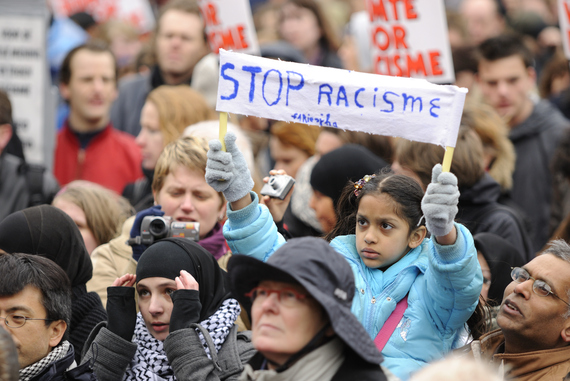Our world is changing. There is a rise in divisiveness. What is most troubling is that this divisiveness is not just about race, gender and sexual orientation as we often see here in the United States.This divisiveness seems to be much broader. It is grounded in a fundamental belief in "us versus them" and an assumption that "the other diminishes me or takes away from me." The answer for some seems to be that "in order for me to be okay, for me to have what I need, we have to keep the others out. We have to build a wall, seal our boarders and ban travel." These beliefs and assumptions are fueled by fear and in some cases feelings of desperation and have become highly polarizing. Some are calling it a rise in populism or nationalism, I see it as an opportunity for us to evolve as human beings by leveraging the power we all have... the power to change our minds and to change our world.
As human beings, we all have mental models or beliefs about the way things are and the way things ought to be. These mental models or beliefs become the lens through which we perceive, interpret and respond to everything in our world. We think and act based on our beliefs. The question is: "Do we ever get it wrong? Has there ever been a time when your beliefs and perceptions turned out to be incorrect? Think about it. Let's take something simple. Have you ever over-reacted to a situation or taken something personally? Have you ever perceived tone in an e-mail, text or tweet, when there really was no tone? We all have. This is what we tend to do: We experience something and we instantly project our fears, our beliefs and assumptions onto that experience and that becomes the way we see it and the way we respond to it. And yes, we often get it wrong. There was indeed another way to look at it! If we are lucky these errors have no consequences or blow-back. However, in most cases there is a consequence when we don't question the beliefs and assumptions that are driving our actions. In addition, in many cases we end up limiting ourselves and others when we won't even consider or admit that we could be wrong about what we believe or assume.
Just like we can misperceive the tone in an e-mail or text, is it possible that the beliefs and assumptions underlying the increased divisiveness in our world could also be wrong; a misperception or incorrect conclusion?
Here in lies the opportunity for us as human being to evolve. Our greatest power as human beings is the power of our minds. Neuroscience has revealed the power of our minds to shape every aspect of our lives, from how we think and act to how we look and feel. Before the advances in our understanding of the mind, we thought the brain was fixed. What was wired together always fired together. If we experienced something, we could anticipate our response to it because it was hard-wired in our neural network. Many of us never questioned our behaviors or the assumptions or beliefs driving them. Things seemed automatic. We were the way we were, we thought the way we thought. Many of us found it very hard to change. But now we know differently.
We now understand how powerful the mind truly is. Instead of reacting automatically or mindlessly, we can stop before we simply react and choose a better response. We can also examine our beliefs, the lens through which we perceive, interpret and respond to our world. We can deconstruct our mental models by identify the thoughts and behaviors the mental model or belief invokes and the consequences it causes. Then we can identify a new way of thinking and acting. Every time we interrupt our automatic responses driven by our old belief system and choose a new response based on a new belief and way of thinking, we are actually re-wiring our neutral network. This is called neuroplasticity in action.
To evolve as human beings, to turn away from divisiveness we have to start by examining our beliefs and assumptions. Is the assumption that "the other diminishes me or takes away from me" really true? We must ask ourselves, is there another way of looking at this? Is it possible that a belief in "one and all' instead of "us versus them" is better for all of us, not just some of us?
Excerpts from: The Objective Leader: How To Leverage the Power of Seeing Things As They Are.

